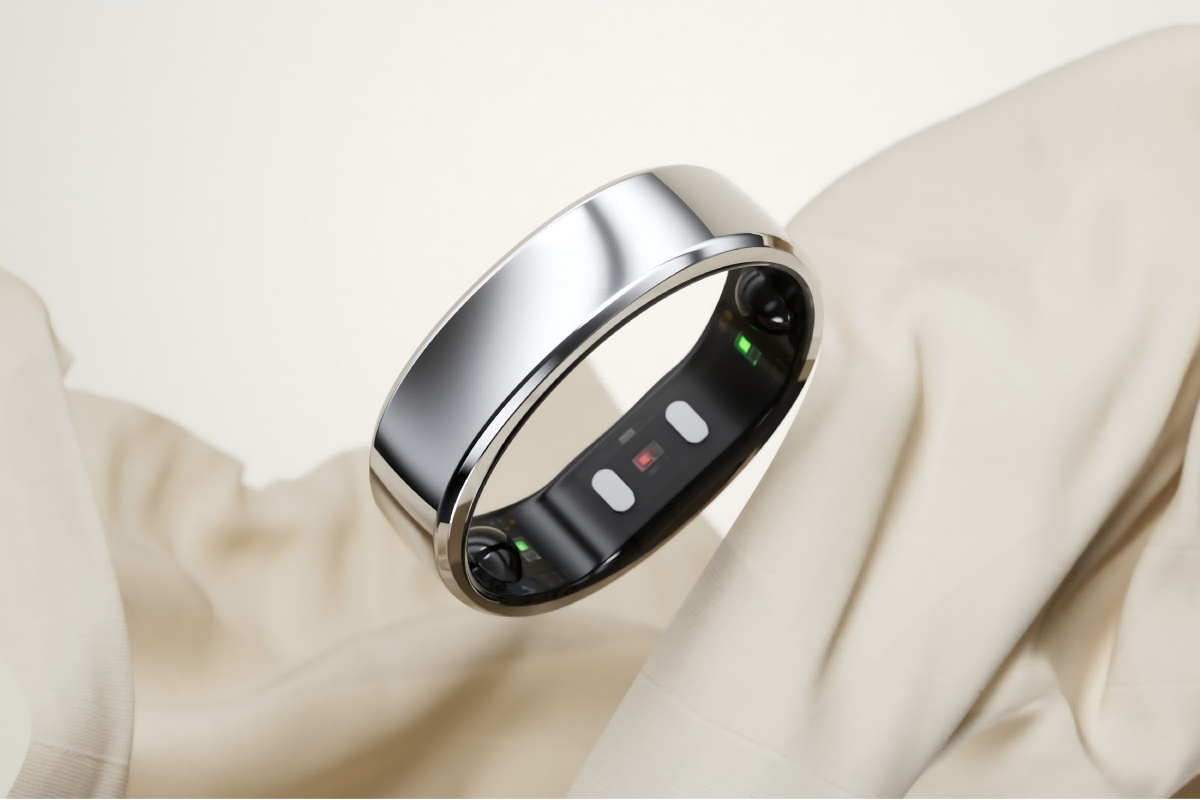Think about being able to check your health without doing anything. With AI-powered wellness devices that watch you all the time, this is now possible. Wearable artificial intelligence in the form of smart rings is the next big thing in personal health management. They give you a whole new way to look at your daily health trends.

The Science Behind AI Health Analytics in Wearable Devices
Emerging smart ring technology condenses advanced sensors into a form factor the same size as the conventional wedding band. The miniature powerhouses leverage photoplethysmography (PPG) sensors, accelerometers, and temperature sensors to provide vital health information every second of every day.
The magic occurs when artificial intelligence comes into contact with raw sensor data. Machine learning algorithms crunch millions of data points to find patterns that would be impossible for humans to discern. Intelligent health tracking is much more than mere step tracking or simple heart rate monitoring.
Real-Time Health Pattern Recognition
Smart ring health tracking is very good at finding small changes in the body that could mean new health problems. The technology looks at changes in heart rate, skin temperature, and movement patterns to make a full health profile for each person.
After some time, these programs learn how you normally behave. When there are deviations, the system can warn of possible problems before they show any signs. This feature helps athletes make the best use of their training plans, and health-conscious people depend on it to spot early signs of illness or overwork.
Sleep Intelligence and Apnea Detection
One of the smartest uses of wearable AI is sleep research. Smart ring AI looks at many sleep metrics at the same time, like changes in heart rate, blood oxygen levels, and movement patterns during rest times.
Potential sleep apnea events can be found by the technology by noticing trends in breathing and oxygen levels. Even though these devices can't replace a doctor's evaluation, they do collect useful information that users can share with their doctors to have better conversations about sleep health.
Smart AI for Personalized Health Coaching
AI-powered wellness devices convert raw data into actionable advice. The system adapts based on your reaction to various living options and creates a personalized coaching plan that suits your requirement and taste in the long run.
This personalized approach considers factors such as work routine, physical fitness regime, and stress levels to provide recommendations when needed. The AI grows increasingly attuned to your lifestyle habits and health trends, and thus the coaching gets more accurate and helpful.
How Machine Learning Revolutionizes Personal Health Tracking
Traditional health monitoring relies on periodic snapshots of your condition. Machine learning changes this paradigm by creating a continuous, evolving picture of your health status that improves with every data point collected.
Tracking vital signs all the time
With smart ring technology, you can be watched around the clock without having to carry around a bulky fitness tracker. During the day and night, the device records your skin temperature, resting heart rate, and heart rate variations, giving a full picture of your health.
This constant tracking shows patterns that measurements taken at different times miss completely. Recovery times after working out, how people deal with stress on hard days, and changes in the quality of sleep can all be seen by collecting data regularly and using AI to analyze it.
Women's Health AI Predictions
Smart health monitoring has recently made it possible to monitor women's reproductive health. The AI program deciphers the high-resolution physiological signals to predict menstrual cycles, fertile windows, and hormonal fluctuations with stunning precision.
The technology takes into account a number of biomarkers at once, such as body temperature, heart rate patterns, and activity levels. The integrated method offers more precise predictions than conventional calendar-based techniques and is useful both to family planning and reproductive health awareness in general.
Stress Management Through AI Analysis
Stress detection through wearable artificial intelligence represents a breakthrough in mental wellness monitoring. The system identifies stress responses by analyzing heart rate variability patterns, sleep disruptions, and activity changes that correlate with elevated stress levels.
When stress indicators are detected, AI-powered wellness devices can suggest immediate interventions. These might include breathing exercises, brief meditation sessions, or recommendations for activity changes to help manage stress levels in real-time.
Comprehensive Activity and Fitness Intelligence
Modern smart ring AI goes beyond basic activity tracking to provide sophisticated fitness insights. These devices can monitor various physical activities through both automatic detection and manual selection, adjusting metrics and recommendations based on the specific demands of each exercise type.
AI-Enhanced Activity Recognition
With activity monitoring capabilities, you don't have to enter information by hand, and the tracking is more accurate. The system can tell the difference between walking, running, cycling by looking at the specific body movements and responses that are linked to each one.
Integrated Health Ecosystem
Smart ring technology is effective in establishing the link between different aspects of your health data. The technology syncs well with smartphones and health platforms to develop an overall picture that comprises activity, sleep, stress, and recovery tracking measures.
This blending allows further analysis and counseling. As an example, the system can counsel differences in exercise intensity based on sleep quality ratings, or counsel stress management when physical activity levels and heart rate variability are at a level indicating high stress.
Data Security and Privacy in AI Health Devices
Health data privacy concerns are legitimate and important considerations for anyone using AI health monitoring technology. Reputable manufacturers implement multiple layers of protection to safeguard sensitive personal information.
Encrypted Health Data Protection
Modern smart ring devices employ advanced encryption protocols to protect data both during transmission and storage. End-to-end encryption ensures that health information remains secure as it travels between the device, smartphone apps, and cloud services.
Local data processing capabilities mean that much of the AI analysis happens directly on the device or your smartphone, reducing the amount of sensitive information that needs to be transmitted or stored remotely.
Personal Health Data Control
Users maintain control over their health information through granular privacy settings. Most platforms allow you to choose exactly what data to share, with whom, and for what purposes. This control extends to healthcare provider integration and third-party app connections.
Transparency in data usage policies helps users make informed decisions about their privacy preferences. The best systems provide clear explanations of how data is used, stored, and protected throughout the entire process.
AI Processing and User Privacy Balance
Precise AI health monitoring does require an enormous amount of data analysis, but this does not need to be achieved at the expense of user privacy. Edge computing allows for a great deal of the AI processing to occur on-premises, which safeguards privacy while still providing incredibly useful insights into health.
This approach reduces the transmission of data while also rendering the health monitoring system more intelligent and quicker. The users are able to enjoy advanced AI capabilities without sacrificing authority over their own health information.
FAQ about AI-powered wellness devices
Q1: How do the AI features protect my privacy?
A: AI-powered wellness devices use encryption, local processing, and user-controlled privacy settings to protect personal health data while still providing intelligent insights and recommendations.
Q2: How accurate is the AI monitoring of the smart ring?
A: While very accurate for fitness and wellness tracking, these devices are not medical instruments and should not replace professional healthcare consultation for medical concerns.
Q3: How does the sleep apnea monitoring feature work?
A: The system analyzes blood oxygen levels, heart rate patterns, and breathing irregularities during sleep to identify potential apnea events, though medical diagnosis requires professional evaluation.
Q4: How accurate is the health prediction feature?
A: AI predictions often exceed 90% accuracy by analyzing multiple biomarkers, though individual results may vary based on personal health factors and consistency of use.



Leave a comment
This site is protected by hCaptcha and the hCaptcha Privacy Policy and Terms of Service apply.